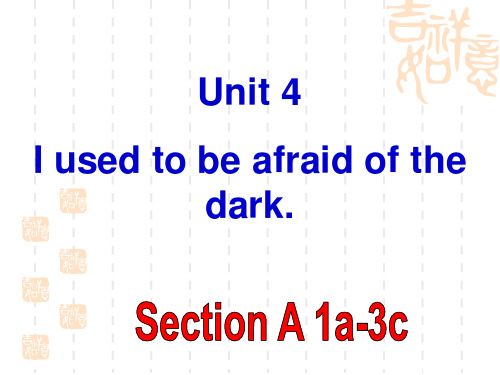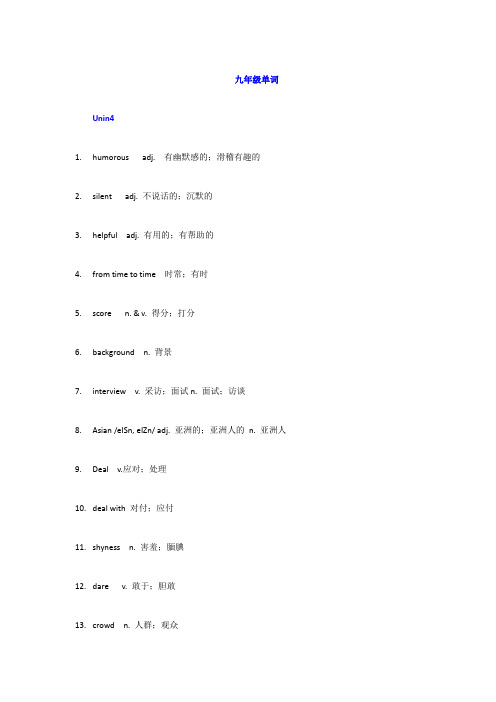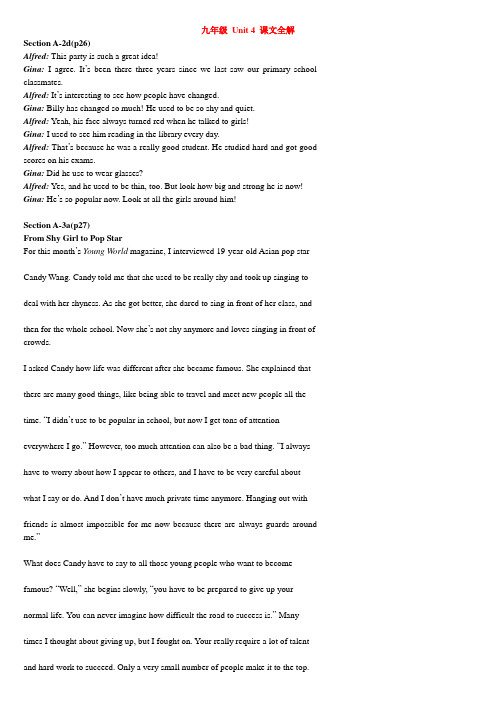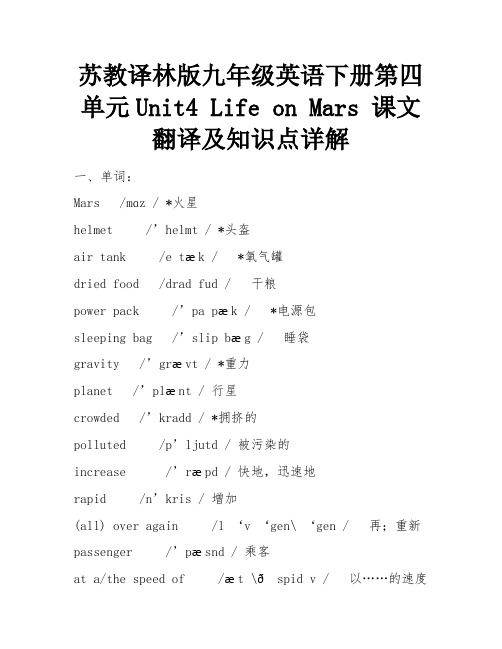2014秋季九年级英语unit4课文单词
2014年版新目标英语九年级Unit+4全单元课件

Look at the pictures and describe the people. What does he/she look like?
short/ brown hair 短/黄头发
long /black hair 长/黑头发
What does he/she look like?
curly hair 卷发
本句是一个反义疑问句,反义疑问句的特点 是“前否后肯”或“前肯后否”,而且后半句在时 态、人称和数等方面必须与前半句保持一致。 ► You are a doctor, aren’t you?
你是个医生,是吗? ► we can’t take books out, are we?
我们不能把书带出去,对吗?
He/She used to be/have/wear…, but now he/she is/has/wears ….
short/tall young/old heavy/thin
VS
He was shy when he was a child, but he is really smart now. He used to be shy but now he is really smart.
1.Mario used to be__sh__o_rt_ . He used to 2. weagrl_a_s_se_s___. 2. Amy used to be__t_a_ll____. She used to
have _s_h_o_r_t__hair. 3. Tina used to have__r_e_d_ and__c_u_r_l_y hair.
a ________ team.
outgoing
swim
九年级英语Unit4单词及重点词句

Unit 4单词1 百万2医学的,医疗的3 研究,调查4 领带5 烦恼,忧虑6 如果……将会怎样7 小脓包;丘疹8有活力的;精力充沛的9 自信的;有把握的10 语序;许可11(反身代词)她自己;她本身12使恼怒;打扰13一点也不;根本不14使生气;使烦恼15相当的;还算16充足;大量17很多的;足够的18与···相处19(有共同的兴趣··人形成的)圈子;阶层20听者;收听者21知识渊博的、有见识的22代表;表示23使···失望或沮丧24提出;想出(主意、回答等)25剩余部分;其余26帮助;救助27急救28附近的;近处的29架子;搁板30出版;发表31覆盖;遮掩32按;挤;压33深的34顺楼梯而下;在楼下35对的;正确的36烧伤;烧坏37膝;膝盖38疼;疼痛39(身体部位)感到疼痛40提供41拒绝;回绝42有帮助的;有用的43对待44火、热或酸所造成的伤害或伤痕重点词句P26-271虚拟语气的用法2如果你有很多钱你会做什么3和…分享..4把它捐给慈善机构5把它存到银行6如果你有一百万美元你会做什么7hundred、thousand、million的用法8把他捐给医学研究9聚会迟到10他不知道穿什么11他不知道是否应该带礼物12他找不到他的鞋13在聚会上14可能不认识任何人15如果我是你我会穿衬衫打领带16有点迟17带一个小礼物18和Tom谈话19不必做某事20如果其他每个人都带礼物了怎么办呢21如果我不认识任何人该怎么办P281喜欢聚会2我不知道该说什么做什么3变的紧张4长脓包5看起来很糟糕6我该怎么办呢7参加大型考试前的晚上我睡不着8我太累了考不好9对这个问题有帮助10吃大量的水果和蔬菜11喝大量的水12如果我是你我会在睡觉前散步13帮助你放松14看起来友好15让某人做某事16狗可能会很麻烦17like作为像的意思18养一个小宠物P291在公共场合2害怕在公共场合发言3见陌生人4几乎不5对人的性格进行提问6对人的外貌进行提问7让某人做某事8演讲9在全校面前10未经许可11拍电影12如果有人让你拍电影你会怎么办13和…交朋友14感冒15告诉某人做某事16征求我的许可17我会什么也不说18开始做某事19自我介绍20等某人做某事21把A介绍给B22邀请某人做某事23吃饭24在我家P301对于绝大多数问题2相当自信3社会形势4使某人烦恼5一点也不6如何得到它7使某人生气8大量的朋友9plenty of用法10某人的陪伴11你很容易相处12一、两个人13而不是14你喜欢和一两个人交谈而不是和一个小组15宁愿做….也不做…16呆在家17 看书18 去参加聚会19 你的好友圈很小20 如果朋友说你坏话,你会马上和这个朋友谈话吗21 立刻,马上22 什么也不说23 考虑他/ 她说的话P311 我一整天都在学习2 演讲3 在许多人面前谈话我感到紧张4 对…友好5 我的胃感觉难受6 变质的东西7 午饭时8 实际上9 和朋友在一起很健谈10 对我们全市非常重要的英语演讲比赛11 代表班级参加学校的比赛12 名列前茅13 让某人失望14 她害怕在其他人面前讲话15 想起好建议给她16 想出17 …解决办法18 剩余的学生你认为我应该告诉梅什么P321 了解2 急救书3 在书架上4 在你家5 有丰富的做…的经验6 出版7 在…给出建议8 在许多不同情形下9 这是从书中摘录的两页10 偶然地11 用…盖住…12 被…覆盖13用力挤压14一个很深的伤口15掉下楼下16匆忙做某事17以…速度18得到医疗帮助19使她舒服20和他呆在一起21弄清楚22烧伤面23在流动的凉水下24弄伤膝盖25当你在跑步的时候26觉得疼痛27停止锻炼28超过29几天30看医生31为某人提供某物32拒绝做某事33抽烟的危害34把某物藏离某人35网友36同意做某事37在公共场所38单独去39向医生寻求建议。
2014人教版九年级英语Unit4英汉互译

2014人教版新目标初中英语九年级Unit 4课文翻译I used to be afraid of the dark. 我过去怕黑。
Role-play the conversation. 分角色表演以下对话。
Alfred: This party is such a great idea!Gina: I agree. It’s been three years since we last saw our primary school classmates. Alfred: It’s interesting to see how people have changed.Gina: Billy has changed so much! He used to be so shy and quiet.Alfred: Yeah, his face always turned red when he talked to girls!Gina: I used to see him reading in the library every day.Alfred: That’s because he was a really good student. He studiedhard and got good scores on his exams.Gina: Did he use to wear glasses?Alfred: Yes, and he used to be thin, too. But look how big and strong he is now!Gina: He’s so popular now. Look at all the girls around him!艾尔弗雷德:这个聚会真是一个好主意!吉娜:我同意。
自从我们小学同学上次见面以来已经三年了。
艾尔弗雷德:看看各人有哪些变化很有趣。
吉娜:比利的变化可大了!他过去很害羞,很文静。
九年级单词unit 4

九年级单词Unin41.humorous adj. 有幽默感的;滑稽有趣的2.silent adj. 不说话的;沉默的3.helpful adj. 有用的;有帮助的4.from time to time 时常;有时5.score n. & v. 得分;打分6.background n. 背景7.interview v. 采访;面试n. 面试;访谈n /eISn, eIZn/ adj. 亚洲的;亚洲人的n. 亚洲人9.Deal v.应对;处理10.deal with 对付;应付11.shyness n. 害羞;腼腆12.dare v. 敢于;胆敢13.crowdn. 人群;观众14.private adj. 私人的;私密的15.guard n. 警卫;看守v. 守卫;保卫16.require v. 需要;要求17.European adj. 欧洲的;欧洲人的18.British adj. 英国的;英国人的19.speech n. 讲话;发言20.public n. 民众adj. 公开的;公众的21.in public 公开的;在别人(尤指生人)面前22.ant n. 蚂蚁23.insect n. 昆虫24.influence v. & n. 影响25.seldom adv. 不常;很少26.absent adj. 缺席;不在27.failv. 失败;未能(做到)28.examination n. 考试;审查29.boarding school 寄宿学校30.in person 亲身;亲自31.exactly adv. 确切地;精确地32.pride n. 自豪;骄傲33.take pride in 为⋯⋯感到自豪34.proud adj. 自豪的;骄傲的35.be proud of 为⋯⋯骄傲;感到自豪36.grandson n. 孙子;外孙37.general adj. 普遍的;常规的;总的n. 将军introduction n. 介绍。
2014年秋季新版新目标英语九年级Unit 4Section A2

dare crowd ton private guard require
v. 敢于;勇敢 n. 人群;观众 n. 吨;(pl.) 大量;许多 adj. 私人的;私密的 n. 警卫;守卫 v. 守卫;保卫 v. 需要;需求
Lead in 1
Review
Use “used to” and “but now” to describe the following picture.
2. Unlike the Chinese, the Americans ____ their meals with knives and forks. (2010江苏无锡) A. used to taking B. are used to taking C. used to take D. are used to take
3b Read the article again and complete the sentences about Candy. P27
3c Suppose you’re the interviewer and your partner is Candy. Ask and answer questions. P27
注: 另附word文档。 点击此处链接
选择可以填入空白处的最佳选项。 1. — Wow! You look different! You _____ wear glasses. — Yes, I did. But now I am wearing contact lenses (隐形眼镜). (2010湖北咸宁) A. could B. must C. used to D. would
Activity eat… read… watch…on TV
Past
go for it 2014版九年级 Unit 4 课文

九年级Unit 4 课文全解Section A-2d(p26)Alfred: This party is such a great idea!Gina:I agree. It’s been there three years since we last saw our primary school classmates.Alfred: It’s interesting to see how people have changed.Gina: Billy has changed so much! He used to be so shy and quiet.Alfred: Yeah, his face always turned red when he talked to girls!Gina: I used to see him reading in the library every day.Alfred: That’s because he was a really good student. He studied hard and got good scores on his exams.Gina: Did he use to wear glasses?Alfred: Yes, and he used to be thin, too. But look how big and strong he is now! Gina: He’s so popular now. Look at all the girls around him! _______________________________ _______________________________ _______________________________ _______________________________ _______________________________ _______________________________ _______________________________ _______________________________ _______________________________ _______________________________ _______________________________ _______________________________Section A-3a(p27)From Shy Girl to Pop StarFor this month’s Young World magazine, I interviewed 19-year-old Asian pop starCandy Wang. Candy told me that she used to be really shy and took up singing to deal with her shyness. As she got better, she dared to sing in front of her class, andthen for the whole school. Now she’s not shy anymore and loves singing in front of crowds.I asked Candy how life was different after she became famous. She explained that there are many good things, like being able to travel and meet new people all the time. “I didn’t use to be popular in school, but now I get tons of attention everywhere I go.” However, too much attention can also be a bad thing. “I always have to worry about how I appear to others, and I have to be very careful about what I say or do. And I don’t have much private time anymore. Hanging out withfriends is almost impossible for me now because there are always guards around me.”What does Candy have to say to all those young people who want to become famous? “Well,” she begins slowly, “you have to be prepared to give up your normal life. You can never imagine how difficult the road to success is.” Many times I thought about giving up, but I fought on. Your really require a lot of talent and hard work to succeed. Only a very small number of people make it to the top. _______________________________ _______________________________ _______________________________ _______________________________ _______________________________ _______________________________ _______________________________ _______________________________ _______________________________ _______________________________ _______________________________ _______________________________ _______________________________ _______________________________ _______________________________ _______________________________ _______________________________ _______________________________ _______________________________ _______________________________ _______________________________ _______________________________ _______________________________ _______________________________ _______________________________ _______________________________ _______________________________ _______________________________ _______________________________ _______________________________ _______________________________ _______________________________ _______________________________Section B-He Studies Harder Than He Used toLi Wei is a normal 15-year-old boy from the countryside. He works very hard and does well in school. It is hard to believe that he used to have difficulties in school. When he was a little boy, he seldom caused any problems, and his family spent a lot of time together. ________________. His parents moved to the city to look for job, and his grandparents came to take care of him. But he missed his parents so much and he often felt lonely and unhappy.Li Wei’s unhappiness began to influence his schoolwork. He became less interested in studying. Sometimes he was absent from classes and failed his examinations. Finally, Li Wei’s parents made the decision to send him to a boarding school. However, Li Wei was shy and was not able to make friends quickly in school. He found life there difficult. One day he told his teacher that he wanted to leave the school. _______________and she called his parents. She advised them to talk with their son in person. So his parents took 24-hour train and a 5-hour bus ride to get to Li Wei’s school.________________. “It was exactly what I need,” he said. “Now I understand that even though they are busy, they are always thinking of me. They take pride in everything good that I do.”After that, Li Wei’s parents had much more communication with their son than hey used to. _______________. He became more outgoing and made some good friends in school. He even joined the school basketball team and became active in many other activities. “I’m much happier now, and I work even harder than I used to. I know my parents love me and they’re always proud of me,” says Li Wei. “It’s very important for parents to be there for their children.”_______________________________ _______________________________ _______________________________ _______________________________ _______________________________ _______________________________ _______________________________ _______________________________ _______________________________ _______________________________ _______________________________ _______________________________ _______________________________ _______________________________ _______________________________ _______________________________ _______________________________ _______________________________ _______________________________ _______________________________ _______________________________ _______________________________ _______________________________ _______________________________ _______________________________ _______________________________ _______________________________ _______________________________ _______________________________ _______________________________ _______________________________ _______________________________ _______________________________ _______________________________ _______________________________ _______________________________ _______________________________ _______________________________ _______________________________ _______________________________ _______________________________ _______________________________ _______________________________。
九年级英语单词表Unit4

九年级英语单词表Unit4九年级英语单词表Unit 4引导语:英语词汇量的积累使我们学习英语最重要的法门之一。
特别是中小学生他们处在记忆力的黄金时期,单词量的积累显得尤为重要。
以下是YJBYS的店铺为大家整理的九年级英语单词表Unit 4.希望能够帮助大家!Unit 4million n. 百万medical adj. 医学的;医疗的research n. 研究;调查tie n. (=necktie)领带worry n. 烦恼;忧虑what if 如果……将会怎么样pimple n. 小脓疱;丘疹exam n. 考试energetic adj. 有活力的;精力充沛的confident adj. 自信的;有把握的permission n. 允许;许可;准许herself pron. (反身代词)她自己;她本身bother v. 使恼怒;打扰not...in the slightest 一点也不;根本不annoy v. 使生气;使恼怒fairly adv. 相当地;还算plenty pron. 充足;大量plenty of 很多的;足够的get along with 与……相处circle n. (有共同的兴趣、职业等的人形成的)圈子;阶层listener n. 听着;收听者knowledgeable adj. 知识渊博的;有见识的represent v. 代表;表示let...down.. 使……失望或沮丧come up with 提出;想出(主意、回答等) rest n. 剩余部分;其余aid n. 帮助;救助;援助;救护first-aid 急救nearby adj. 附近的;近处的shelf n. 架子;(书橱、柜子等的)搁板come out 出版;发表cover v. 覆盖;遮掩press v. 按;压;挤deep adj. 深的downstairs adv. 顺楼梯而下;在楼下correct adj. 对的';正确的;准确的burn v. 烧伤;烧坏knee n. 膝;膝盖pain n. 疼;疼痛hurt v. (身体部分)感到疼痛;(使)受伤safety n. 安全offer v. 提供refuse v. 拒绝;回绝helpful adj. 有帮助的;有用的treat v. 对待burn n. 火、热或酸所造成的伤害或伤痕Spotty 多斑点的;发疹的(文中用作人名) 【九年级英语单词表Unit 4】。
苏教译林版九年级英语下册第四单元Unit4 Life on Mars 课文翻译及知识点详解

苏教译林版九年级英语下册第四单元Unit4 Life on Mars 课文翻译及知识点详解一、单词:Mars /mɑz / *火星helmet /’helmt / *头盔air tank /e tæk / *氧气罐dried food /drad fud / 干粮power pack /’pa pæk / *电源包sleeping bag /’slip bæg / 睡袋gravity /’grævt / *重力planet /’plænt / 行星crowded /’kradd / *拥挤的polluted /p’ljutd / 被污染的increase /’ræpd / 快地,迅速地rapid /n’kris / 增加(all) over again /l ‘v ‘gen\ ‘gen /再;重新passenger /’pæsnd / 乘客at a/the speed of /æt \ð spid v / 以……的速度unfortable /n’kmf()tb()l / 使人不舒服的,不舒适的oxygen /’ksd()n / *氧气in the form of /n ð fm v / 以……的形式tasty /’test / 味道好的specially /’spel / 专门的,特地float /flt / *飘浮;漂浮pare /km’pe / 比较pare to/with /km’pe tu wð / 与……相比interplanetary /nt’plænt()r / *行星间的network /’netwk / *网络challenging /’tæln(d) / *挑战性的rapidly /’ræpdl / 快地,迅速地aware /’we / *知道,意识到circle /’sk()l / 围绕;将……圈起来agreement /’grim()nt / 一致,同意distance /’dst()ns / *距离;远处possibility /,ps’blt / 可能性alien /’eln / *外星人stranger /’stren(d) / 外来者,陌生人carry out /’kær at / 开展;执行percentage /p’sentd / *百分率;百分数disadvantage /dsd’vɑntd / *劣势,缺点,不利条件risk /rsk / 风险,危险after all /’ɑft l /毕竟goods /ɡdz / *(复)商品,货品electronic /lek’trnk / 电子的entertainment /ent’tenm()nt / *娱乐九年级英语下Unit4单词.mp3点击上方►收听单词发音二、课文翻译:Comic strip1.-Wow,I’ve never thought about travelling into space.哇,我从未想过到太空旅行。
- 1、下载文档前请自行甄别文档内容的完整性,平台不提供额外的编辑、内容补充、找答案等附加服务。
- 2、"仅部分预览"的文档,不可在线预览部分如存在完整性等问题,可反馈申请退款(可完整预览的文档不适用该条件!)。
- 3、如文档侵犯您的权益,请联系客服反馈,我们会尽快为您处理(人工客服工作时间:9:00-18:30)。
2014秋季九年级英语
Unit 4 I used to be afraid of the dark?
humorous adj.有幽默感的;滑稽有趣的silent adj.不说话的;沉默的p.26 helpful /helpfl/adj. 有用的;
有帮助的p.26
from time to time 时常;有时p.26
score n. & v. 得分;打分p.26 background n. 背景p.27
interview v. 采访;面试
n. 面试;访谈p.27
Asian /eisn, eizn/ adj. 亚洲的;
亚洲人的n. 亚洲人p.27 deal with 对付;应付p.27
dare v. 敢于;胆敢p.27
private adj. 私人的;私密的p.27 guard /ga:(r)d/ n. 警卫;看守
v. 守卫;保卫p.27 require v. 需要;要求p.27
European adj. 欧洲的;欧洲人的p.28 British /britis/ adj. 英国的;
英国人的p.28
speech /spi:ts/ n. 讲话;发言p.28
ant /a:nt/ n. 蚂蚁p.29
insect /insekt/ n. 昆虫p.29
influence v. & n. 影响p.30 seldom adv. 不常;很少p.30
proud /praud/ adj. 自豪的;骄傲的p.30 be proud of 为⋯.骄傲;感到自豪p.30 absent adj. 缺席;不在p.30
fail /feIl/ v. 失败;未能(做到)p.30 examination n. 考试;审查p.30 boarding school寄宿学校p.30
in person 亲身;亲自p.30
exactly adv. 确切地;精确地p.30 pride /praid/ n. 自豪;骄傲p.30
take pride in 为⋯.感到自豪p.30 grandson n. 孙子;外孙p.31 general adj. 普遍的;常规的;总的
n. 将军p.32
introduction n. 介绍p.32
Paula 葆拉(女名)p.26
Alfred 艾尔弗雷德(男名)p.26
Billy /bili/ 比利(男名)p.26
Candy 坎迪(女名)p.27
Jerry /dzeri/ 杰里(男名);
杰丽(女名)p.28
Emily /emIli/ 埃米莉(女名)p.28。
